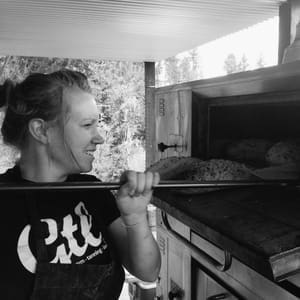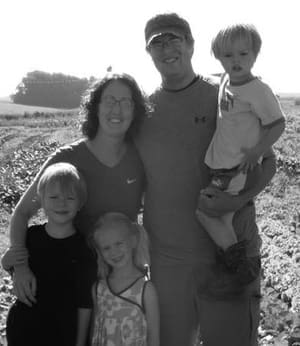I may have pulled my stool a bit close to his workbench, but he did not seem to mind and he didn’t notice. I was in the home of Dave Miller, the pseudo-uncle of bread bakers, as he shaped the loaves for the Saturday market. There were twenty plus years of skill in those hands, and I can still feel the rhythm of it all.
Twenty years of repetitive motion contrasts strongly with the movements of a novice. Starting out as a bread baker is probably more awkward than learning how to skate. And I remember my first loaves as you remember a hard fall. It has been over four years now, twelve hour days, sometimes six days a week, covered in flour and dried out dough, sleeping on flour sacks, and stretching out shoulder aches. Along the way, I have had some teachers who would nail down on me, but the most influential one would walk past me as I mixed a dough, hand me a crust to chew on and say, “Katy, learn to love it.”
At the time, it seemed like an odd thing to say. Especially as the process of learning was not easy to love. Half your days as a bread baker are spent scaling ingredients. Flour, plus water, plus salt. Over and over again—in many forms. During my first six months, I would have to weigh, and reweigh my ingredients, accounting for every gram. Because—believe it or not—five grams of salt can be the difference between a loaf that is alive and a loaf that is dead. This knowledge on its own, was enough to scare the details into me. But, looking back I understand. I was being taught to pay attention.
It was under Michel Suas that I worked harder than I thought possible. He showed me that love for the end product was not enough to make great bread. To love what you do—you need to get to know what you do, you need to practice the process.
What has been most important in learning how to make bread is the willingness to care enough to persevere. To wake up each day and try to be sensitive to something as seemingly innocuous as the temperature outside. You have to be disciplined and focused enough in order to control all the variables; to get the timing and temperature right; to master the dough, before it masters you.
There are a lot of lessons to be learned baking bread. And these are things that I hope I can express in my daily life. I certainly fall short quite a bit, and of course I cannot always make perfect bread. But that is part of it, the striving, is what is important.
—Katrina VandenBerg, Journeywoman Baker
***
How can I put this delicately?
The daily work of my hands leaves my hands smelling of hog feces. The smell is impossible to completely rid myself of. I’ve showered and scrubbed, yet even now as I sit clean and washed and pecking away at my MacBook, I catch a whiff of something amiss. I lift my hands to my face. I inhale. There is no doubt about it. They smell like manure.
That odour can smell as romance for a time. We invite apprentices into the life of our farm each year as a part of our Prairie Apprenticeship Program and to some folks the smell and squish of pig poop can prompt a sort of “I’m a Farmer” kind of moment. It’s as if the smell were incense wafting in from a Wendell Berry novel carrying with it a sense of venerable work, unsullied nativeness, and untarnished community life. But soon enough anyone enlisted to scoop hog stool will come to smell it for what it is and after they’re done and washed in the evening their hands will still smell of feces.
And yet the work of the farm must go on. My alarm goes off at 5:15 each morning. My hands smell. My back and feet ache in the most un-romantic sort of way. I head out to do chores. Pens need to be scooped. Piglets need to be castrated. Barns need to be washed. But, to enter into this larger and significant theological conversation on faith and work, I need not seek to mentally sanitize this day’s poop-scooping activities in order to meet a certain theological rubric of urbane culture making. The work I’m going to do this day is hard, it is smelly, and it will be completely unheralded. But it is good.
This is not work that will “change the world.” But to play off of James Davidson Hunter’s prescription, what I’m called to is a faithful practice. I won’t see the end to much of my work but I am called to it nonetheless. I am in on a long-term project of making a place beautiful. Not frilly and pretty. But a robust and durable beauty that wades into the ambiguity that is farm work amid the thorns and thistles. My poop scooping labor will—over a long, long time—build the fertility of my farm as I return it to the soil. And that will be beautiful. My day-in, day-out faithful practice of cleaning out hog pens will contribute to the health and well-being of my hog herd. This work of mine will not give me cultural weight or financial wealth. But it is aimed at a wealth of durable beauty called shalom.
—Phillip Jensen, Hog Farmer



